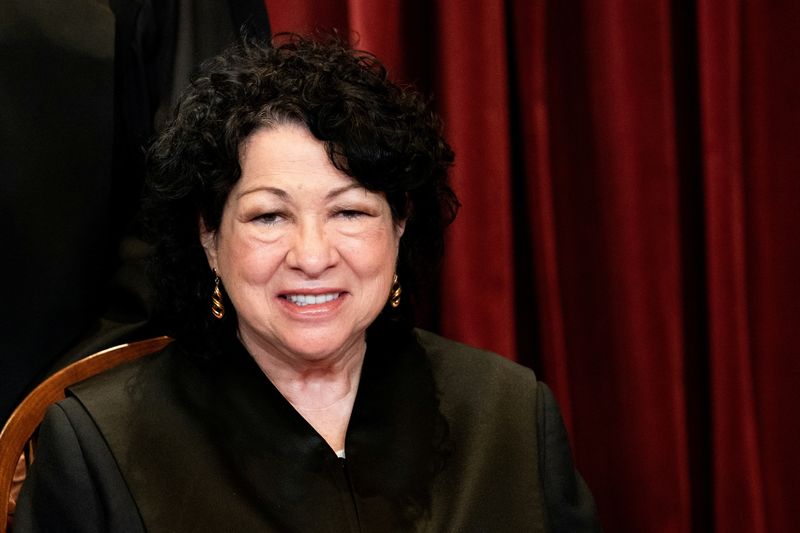By Andrew Chung and Nate Raymond
(Reuters) -U.S. Supreme Court Justice Sonia Sotomayor on Friday permitted Yeshiva University to refuse to recognize an LGBT student club that the Jewish school in New York City has said violates its religious values, temporarily blocking a judge's ruling ordering it to allow the group.
Sotomayor put on hold for now the judge's ruling that a city anti-discrimination law required Yeshiva University to recognize Y.U. Pride Alliance as a student club while the school pursues an appeal in a lower court. The liberal justice handles certain cases for the court from a group of states including New York.
A stay Sotomayor issued of the judge's injunction will remain in place pending a further order from herself or the entire Supreme Court, which has a 6-3 conservative majority.
Yeshiva's student club application process was set to end on Monday, and the school said that absent the court's intervention it would be forced to recognize Y.U. Pride Alliance in violation of its religious values.
"We are grateful that Justice Sotomayor stepped in to protect Yeshiva’s religious liberty in this case," Eric Baxter (NYSE:BAX), a lawyer for Yeshiva at the conservative legal group Becket Fund for Religious Liberty, said in a statement.
Katherine Rosenfeld, a lawyer for the club, said it will await a final order from the court and remains committed to creating a safe space for LGBT students on the university's campus "to build community and support one another without being discriminated against."
Y.U. Pride Alliance formed unofficially as a group in 2018 but Yeshiva determined that granting it official status would be "inconsistent with the school's Torah values and the religious environment it seeks to maintain."
The dispute hinges in part on whether Yeshiva is a "religious corporation" and therefore exempt from the New York City Human Rights Law, which bans discrimination by a place or provider of public accommodation.
New York state judge Lynn Kotler in June determined that the school's primary purpose is education, not religious worship, and it is subject to anti-discrimination law. Kotler also rejected the university's argument that forcing it to recognize the club would violate its religious freedom protected under the U.S. Constitution's First Amendment.
After higher state courts in August refused to stay the judge's ruling, Yeshiva turned to the U.S. Supreme Court, emphasizing its religious character, including that undergraduate students are required to engage in intense religious studies.
"As a deeply religious Jewish university, Yeshiva cannot comply with that order because doing so would violate its sincere religious beliefs about how to form its undergraduate students in Torah values," the school told the Supreme Court.
The Modern Orthodox Jewish university, based in Manhattan, has roughly 6,000 students enrolled in undergraduate and graduate programs. Among the school's values, according to its website https://www.yu.edu/about/values, are believing in "the infinite worth of each and every human being" and "the responsibility to reach out to others in compassion."
Powered by its increasingly assertive conservative justices, the U.S. Supreme Court in recent years has expanded religious rights while narrowing the separation between church and state.

During its term that ended in June, the court backed a public high school football coach in Washington state who refused to stop leading Christian prayers with players on the field after games and ruled in favor of Christian families in Maine who sought access to taxpayer money to pay for their children to attend religious schools.
In its upcoming term, which begins on Oct. 3, the court will decide a major new legal fight pitting religious liberty against LGBT rights involving an evangelical Christian web designer's free speech claim that she cannot be forced under a Colorado anti-discrimination law to produce websites for same-sex marriages.